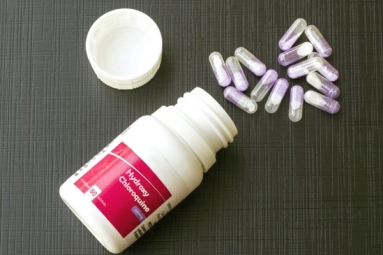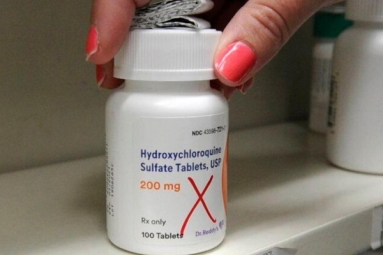
(Image source from: usatoday.com)
The anti-malaria drug that has been consistently promoted as “safe” by President Donald Trump could do more harm than good to your body, as per the new studies. The same was found tied to heightened risks of not just heart rhythm problems but also issues with death, which is one of the reasons why it is not safe for consumption without prescription orders.
The same was found in a study conducted globally consisting of 100,000 patients across the world.
The study that was published on Lancet is not just a rigorous study but a full blown and the largest look at the use of the drug in the real world settings, across 671 hospitals globally.
Dr. Mandeep Mehra, a heart specialist at Brigham and Women's Hospital in Boston found that the drug is not beneficial but showed significant signs of harm on the patients it was administered on.
The researchers further estimated that the death rate in the patients taking the anti-malaria drug along with the antibiotic azithromycin had a death rate of 13% in comparison to 9% which was found in the individuals not taking the drug.
The risks of developing an irregular heart rhythm are again 5 times more than normal.
Dr. David Aronoff, infectious diseases chief at Vanderbilt University Medical Center reported that even if this is an observational study, it provides with a lot of insight into the current situation and can provide with an alarming signs for the individuals who have been self treating their symptoms with hydroxychloroquine.
President Trump has been very consistent in pushing people to take the drug, stating that he himself has been taking the same along with zinc supplements as part of his precautionary steps.
The anti-malaria drugs aside from treating malaria are only approved for the treatment of rheumatoid arthritis, lupus and nothing else at the moment. There have been no rigorous or large scale tests that have proved the efficacy of this drug in preventing the risks associated with Covid-19.
“People sick enough to be hospitalized with the coronavirus are not the same as healthy people taking the drugs in other situations, so safety cannot be assumed from prior use,” said Mehra.
These drugs have been alarmed for their serious side effects that they impose, as per the reports from the Food and Drug Administration. The FDA has also warned people of the ill effects that the combination of antibiotics with hydroxychloroquine can bring along.
Mehra further said that with the lacking tests and trials, the researchers need to look at the real-time results. The results from these patients which have been administered with the drug and their faith is as real as the situation does get.
The study conducted by Mehra assessed 15,000 people with Covid-19 being administered with a combination of the anti-malaria drug with the antibiotics and the rest 81,000 patients getting nothing.
In all of them, 1,868 patients took chloroquine alone, 3,783 patients took the same with an antibiotic, 3,016 took hydroxychloroquine alone and 6,221 took the same with an antibiotic.
The ratio of the death was found to be 9:16:18:22:24 for the patients’ death taking none of the drugs, taking chloroquine, taking hydroxychloroquine, chloroquine and antibiotic and hydroxychloroquine and antibiotic respectively.
Following taking notes of all the standard health risks and hazards that the patients experience, the researchers concluded that the use of the drugs increased the death rate by 34% to 45%.
Around 8% of the patients who took a combination of the hydroxychloroquine with the antibiotic reported the issues of irregular heart rhythm in comparison to 0.3% who didn’t experience the same by not taking the drug.
Christian Funck-Brentano, Professor of the Sorbonne University in Paris reported that these drugs are not good but harmful for the body.
The studies that are now going to be conducted on this drug will have stricter rules imposed to ensure that the drug can be stopped from being administered completely, especially because of the risks associated with it.
Even though the study published on Lancet covers a lot of patients and is a large scale study, it is observational at this point and doesn’t compare to a full blown large scale clinical trial.
By Somapika Dutta

















